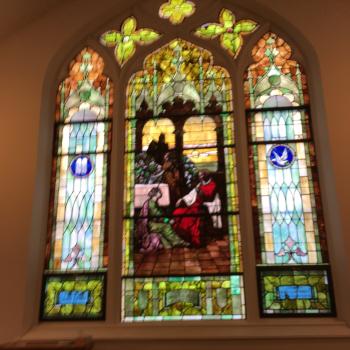This is not a long post. This is not a critically reasoned post. Rather, it is an attempt to explain, partly to myself, why I have decided participate in a bit of Facebook activism. I don’t usually participate in the social actions that crop up on Facebook, and indeed at times I have been openly critical of folks who, for example, superimpose a French tri-color over their profile picture, particularly if they have never given any indication prior to this that these were issues they cared about. But this campaign #IamaStranger, started by two Franciscan Friars, has grabbed me viscerally as something I must do. The campaign is simple: take a picture of yourself like the one below, include the above hashtag, and share it on social media.
Long time readers will recognize my skullcap and keffiyeh. I have blogged before about wearing these, and I am resolved to continue wearing them. I say this just to make clear that this is not a costume I donned for the photo, but something I have worn and will continue to wear. (Indeed, as I type this I am getting ready to go to mass wearing them.)
This weekend, Trump’s executive order barring the entry of people from seven Muslim countries (but permitting entry from other Muslim countries, including the UAE and Saudia Arabia) has been causing chaos at home and abroad. As of early this morning, three federal courts have issued injunctions against parts of the executive order: the courts have ordered that green card holders and those with valid visas currently in the US should not be deported and should be released immediately. However, reports are that CPB agents at various airports are continuing to ignore the court order. Over the weekend there were large, spontaneous demonstrations at a number of international airports.
I do not want to take the time to analyze this executive order in depth: suffice it to say that I find it a poor policy choice and one that is motivated by xenophobia and intolerance despite the claims that it is to protect national security. Rather, I want to say a word about how it strikes home with me, both professionally and personally. On a professional level, this order will probably cost my department the opportunity to interview a promising job candidate, an Iranian currently living and working in France. My Facebook feed, heavily populated with academics, is beginning to fill with stories of students and academics who can either not leave the US to go home, or worse, are now trapped abroad and unable to come to the US.
On a personal level, I am reminded of a story from my own past, something that happened to my own father, who was an “illegal.” He came to America in 1939 on a short term tourist visa and never left. Sometime around 1942 he was able to get a green card: the details are lost in the sands of time, but apparently my father befriended members of the local Republican establishment, who interceded in the process and helped him get his papers. My brother, who has read the documentation, summarized their support as follows: he’s here and he doesn’t cause any trouble; he’s a “good Mexican”. Shortly after this, my father received a draft induction notice and departed for Milwaukee for his physical. (This was actually reported in the local paper; I have a clipping.) Immediately afterwards, however, my father refused induction, claiming that as a resident alien he would serve in the military of his home country, Mexico. I have no idea what happened to make my father change his mind: from later documentation he refers to “great personal indignities” that were heaped upon him at the induction center. I can only presume that he was treated in a condescending and racist fashion. He never talked about this incident with his children: we only learned about it after his death, going through his papers.
For the rest of the war my father supported the war effort as a civilian: he worked in the defense industry (he was an electrician at a heavy machinery corporation) and taught basic electronics and radio usage to members of the signal corps. (He was never called up by the Mexican army.)
After the war a law was passed that barred permanent residents who refused to serve in the military from every becoming citizens. Further, and probably related, said permanent residents were apparently banned from leaving the country—if they did they would not be allowed to return. As an immediate consequence, my father could not go home to his mother’s funeral. The travel ban was eventually lifted, but he never was able to become an American citizen despite years of trying.
The times were different and then and now are not exactly parallel. But I see the same dark forces at work: demonizing the other, and punishing people who are part of the warp and weft of America for being different. This is completely contrary to the call of the Gospels. The radical demand placed on us, as Christians, is to welcome the stranger. We can do so prudently only to the extent that our prudence is grounded in love: we cannot use “prudence” or “realism” as an excuse to rationalize our fears.
As a Catholic, as a Franciscan, I must look on the stranger and see Jesus. And in radical solidarity with Christ, I must identify myself with the foreigner, the refugee, the minority among us. For the love of God I can do nothing else.













